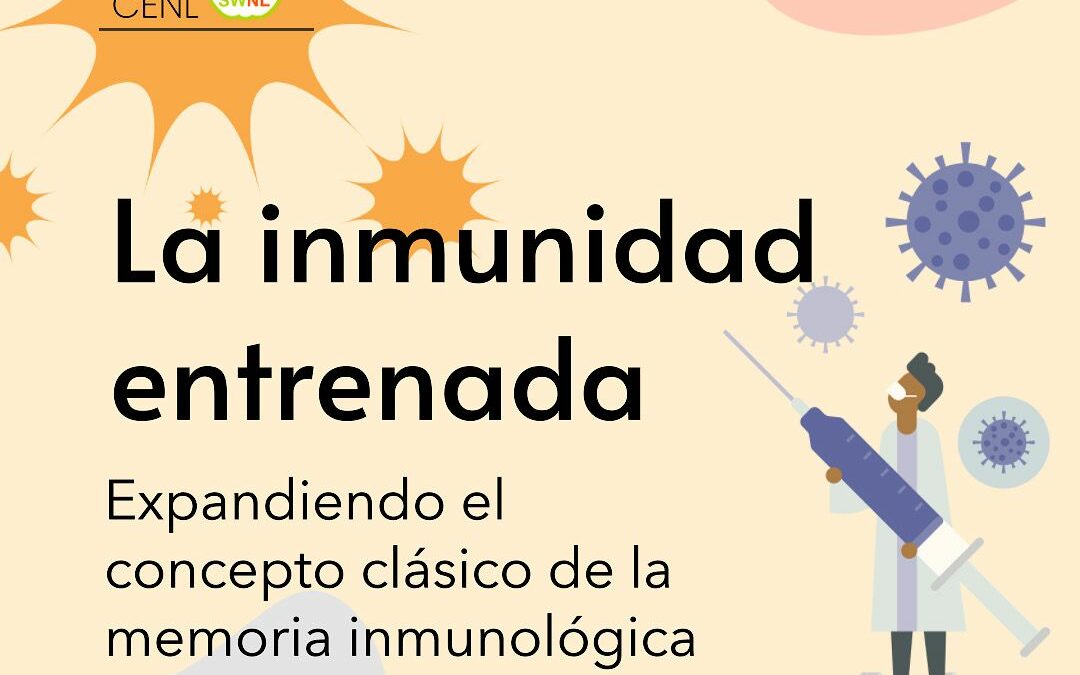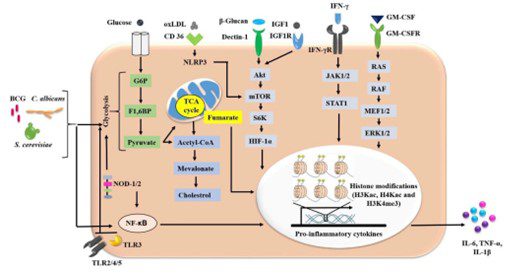Trained immunity is a relatively new concept that has gained prominence in the field of immunology in recent years. This phenomenon refers to the ability of the immune system to become activated when exposed to a series of stimuli, ‘remember’ those previous encounters that triggered the immune response, and use that process to respond more powerfully when it is activated again in response to both the original stimuli and other stimuli. Unlike acquired immunity, which develops after exposure to a specific pathogen and relies on the production of antibodies specific to that pathogen, trained immunity relies on changes in the function of innate leukocytes, such as neutrophils, macrophages and neutrophils. These changes in the function of innate leukocytes are the result of reprogramming of innate immune responses through epigenetic and metabolic changes. Trained immunity can persist for months or even years after initial exposure to the stimulus.
Trained immunity can enhance the immune system’s ability to fight a wide range of pathogens, not just those to which it has been previously exposed. For example, trained immunity has been shown to underlie the non-specific effects of some vaccines, such as the BCG vaccine against tuberculosis or the measles vaccine. In addition to producing specific responses to these diseases, these vaccines produce a general activation of the innate immune system, which decreases mortality from other infectious diseases. These non-specific protective effects have been observed in different populations in Africa, America, Asia, Oceania and Europe, in both children and the elderly.
These effects may even extend beyond ourselves and affect the next generations. Epidemiological studies in Guinea-Bissau have shown that children of mothers or fathers vaccinated with BCG show a higher degree of protection against all types of infections after vaccination with BCG. If both the mother and father have been vaccinated, these protective effects in the next generation are even greater. The potential mechanisms behind these effects were described in a series of experiments in mice, which showed that the progeny of mice that survived a fungal infection were more resistant to bacterial infections. Thus, the importance and consequences of exposure to pathogens and vaccination may extend beyond our own lifetimes, affecting our next generations and ultimately human evolution.
The COVID-19 pandemic has brought home to us the importance of developing new tools in the fight against pathogens that may appear unexpectedly. Pandemics are not exceptions in human history. The emergence of new pathogens or new variants of old pathogens will happen again sooner or later and we must learn from recent experience to be better prepared for the next one.
While the development of classical types of antigen-specific vaccines remains and will remain a fundamental tool for the prevention of future pandemics, the design, development, testing, production and distribution of these vaccines requires at least 12-24 months, even in the most optimistic scenarios. In the early phase of a pandemic, the spread of infection can have disastrous consequences for global health and the global economy, as seen in the case of COVID-19. The development of parallel preventive strategies to increase the overall natural resistance of a host (until specific vaccines can be developed) is essential. One such strategy could be the use and development of vaccines that stimulate trained immune responses and thereby induce broad (partial) protection against multiple pathogens and/or the development of novel adjuvants with such properties.
By this I do not mean that trained immunity is the ultimate solution against upcoming pandemics, or the cure against multiple diseases. Unfortunately, this is not the case. The complete elimination of a pathogen, or a cluster of tumour cells, depends on the appropriate and regulated activation of certain types of innate and adaptive responses. However, it is a fact that most current vaccines and therapies are focused on the activation and regulation of processes involving the adaptive immune system and its specific responses, leaving aside the innate immune system. The development of tools and vaccines that also allow us to activate and control the innate immune system in various pathological situations is essential to develop a new generation of vaccines and therapies for different diseases. We have barely begun to exploit the potential of this branch of our immune system at the therapeutic level. This will undoubtedly change in the coming decades, increasing our arsenal of tools against all kinds of diseases.
References
(Arts et al., 2018; Benn et al., 2020; Berendsen et al., 2019; Domínguez-Andrés et al., 2023; Netea et al., 2020; Schaltz-Buchholzer et al., 2022)
Arts, R. J. W., Moorlag, S. J. C. F. M., Novakovic, B., Li, Y., Wang, S.-Y., Oosting, M., Kumar, V., Xavier, R. J., Wijmenga, C., Joosten, L. A. B., Reusken, C. B. E. M., Benn, C. S., Aaby, P., Koopmans, M. P., Stunnenberg, H. G., van Crevel, R., & Netea, M. G. (2018). BCG Vaccination Protects against Experimental Viral Infection in Humans through the Induction of Cytokines Associated with Trained Immunity. Cell Host & Microbe, 23(1), 89-100.e5. https://doi.org/10.1016/J.CHOM.2017.12.010
Benn, C. S., Roth, A., Garly, M. L., Fisker, A. B., Schaltz-Buchholzer, F., Timmermann, A., Berendsen, M., & Aaby, P. (2020). BCG scarring and improved child survival: a combined analysis of studies of BCG scarring. Journal of Internal Medicine, 288(6), 614–624. https://doi.org/10.1111/JOIM.13084
Berendsen, M. L. T., Øland, C. B., Bles, P., Jensen, A. K. G., Kofoed, P.-E., Whittle, H., de Bree, L. C. J., Netea, M. G., Martins, C., Benn, C. S., Aaby, P., De Bree, C., Netea, M. G., Martins, C., Benn, C. S., & Aaby, P. (2019). Maternal Priming: Bacillus Calmette-Guérin (BCG) Vaccine Scarring in Mothers Enhances the Survival of Their Child With a BCG Vaccine Scar. Journal of the Pediatric Infectious Diseases Society. https://doi.org/10.1093/jpids/piy142
Domínguez-Andrés, J., Dos Santos, J. C., Bekkering, S., Mulder, W. J. M., van der Meer, J. W. M., Riksen, N. P., Joosten, L. A. B., & Netea, M. G. (2023). Trained immunity: adaptation within innate immune mechanisms. Physiological Reviews, 103(1), 313–346. https://doi.org/10.1152/PHYSREV.00031.2021
Netea, M. G., Domínguez-Andrés, J., Barreiro, L. B., Chavakis, T., Divangahi, M., Fuchs, E., Joosten, L. A. B., van der Meer, J. W. M., Mhlanga, M. M., Mulder, W. J. M., Riksen, N. P., Schlitzer, A., Schultze, J. L., Stabell Benn, C., Sun, J. C., Xavier, R. J., & Latz, E. (2020). Defining trained immunity and its role in health and disease. Nature Reviews Immunology. https://doi.org/10.1038/s41577-020-0285-6
Schaltz-Buchholzer, F., Bjerregård Øland, C., Berendsen, M., Bjerregaard-Andersen, M., Stjernholm, E. B., Golding, C. N., Monteiro, I., Aaby, P., & Benn, C. S. (2022). Maternal BCG primes for enhanced health benefits in the newborn. The Journal of Infection, 84(3). https://doi.org/10.1016/J.JINF.2021.12.028
Can you help us to become more? Become a member and participate. Spread our word on the networks. Contact us and tell us about yourself and your project.

Jorge Domínguez Andrés
Assistant Professor in Radboud University
Jorge got his PhD in Biochemistry at the Autonomous University of Madrid with extraordinary award. He is currently PI and assistant professor at the Radboud University Nijmegen Medical Centre.


